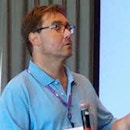CCA Seminar Series: Fred Rasio
- Speaker
-
 Fred Rasio, Ph.D.Joseph Cummings Professor of Physics, Northwestern University
Fred Rasio, Ph.D.Joseph Cummings Professor of Physics, Northwestern University
Title: Merging Black Hole Binaries from Stellar Dynamics
Abstract:
Theoretical predictions for compact binary mergers from field populations of binary stars are extremely sensitive to highly uncertain initial conditions and stellar evolution processes (such as common-envelope evolution), leading, for example, to predicted merger rates for binary black holes that span several orders of magnitude. But in dense stellar environments such as globular clusters, binary black holes form by well-understood dynamical interaction processes. In this talk I will present an overview of recent computational work on the dynamical formation of black hole binaries based on realistic N-body simulations of globular clusters. By calibrating theoretical models against observed Milky Way and extragalactic clusters, we find that mergers of dynamically formed black hole binaries could eventually be detected by Advanced LIGO at a rate of several hundred per year, likely dominating the overall detection rate of gravitational-wave sources.
If you are interested in attending, please contact [email protected] at least 24 hrs in advance to be added to the guest list.
